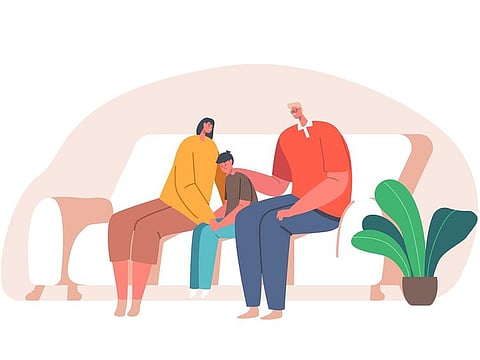Food may be making your child anxious
A change in diet may mean friendlier gut bacteria resulting in a calmer brain

Does your child have a nervous predisposition? An anxious manner? It may not be just a personality trait. Research has over the years pointed to a connection between gut health and brain health – and a new study points to a molecular reason why one affects the other.
A study, published in the journal ‘Nature’ last month, shows that in mice, “... a small-molecule metabolite, produced by bacteria that reside in the mouse gut, can travel to the brain and alter the function of brain cells, leading to increased anxiety in mice. The work helps uncover a molecular explanation for recent observations that gut microbiome changes are associated with complex emotional behaviours,” explains a press release by the Caltech-led team of researchers.
“There is a lot of data showing that gut affects our brain health. The communication system between gut and brain is called ‘gut-brain axis’. These two systems are connected both physically and biochemically in many ways and information flows between them bi-directionally,” says Dr Preeti Sahota, Neurologist at Prime Medical Center.
The gut has neural connections
“The human brain contains approximately 100 billion neurons. Gut walls also contain more than 100 million neurons that are connected to the brain through the nerves in the nervous system. This second brain in gut is called enteric nervous system (ENS) that is responsible for many functions including controlling digestion as well as regulating muscle function, immune cells and hormones.
“Both the neurons in the gut as well as bacteria colonising the gut produce chemicals called neurotransmitters. For example, serotonin is a neurotransmitter produced in the brain that contributes to feelings of happiness and controls the body clock. The gut is actually the largest producer of serotonin,” she adds.
Serotonin is a neurotransmitter produced in the brain that contributes to feelings of happiness and controls the body clock. The gut is actually the largest producer of serotonin.

Gut effect
Did you know? Certain bacteria in animal experiments have been shown to improve social behaviour in the autism spectrum disorder by upregulating oxytocin in the blood and brain, says Dr Sahota. “Similarly, gamma-Aminobutyric acid (GABA) generated by another bacteria works on its receptors in the brain and helps in controlling feelings of anxiety and fear. Other bacteria improved anxiety-like behaviour and communication in a murine model of autism spectrum disorder by reducing 4-ethylphenyl sulfate (EPS). Of course it’s not all good - Lipopolysaccharide (LPS) is an inflammatory toxin made by certain bacteria that can cause inflammation and has been associated with a number of brain disorders such as severe depression, dementia and schizophrenia,” she adds.
Improving mental health through food
Jay Pasricha, M.D., director of the Johns Hopkins Center for Neurogastroenterology, was quoted as saying on the US-based hospital’s website: “Our two brains ‘talk’ to each other, so therapies that help one may help the other. In a way, gastroenterologists (doctors who specialise in digestive conditions) are like counsellors looking for ways to soothe the second brain.
“Gastroenterologists may prescribe certain antidepressants for irritable bowel syndrome, for example — not because they think the problem is all in a patient’s head, but because these medications calm symptoms in some cases by acting on nerve cells in the gut, Pasricha explains. “Psychological interventions like cognitive behavioural therapy may also help to 'improve communications' between the big brain and the brain in our gut,” he says.
The most abused drug in terms of anxiety is food and the most under-utilised is exercise.

“The most abused drug in terms of anxiety is food and the most under-utilised is exercise. When your gut health is not good, that means your gut microbes are imbalanced, which affects your skin, your brain and your hormones – think eczema, polycystic ovary syndrome,” says Shirley D’Souza, a Dubai-based functional nutritionist.
“Most people with gut health issues can’t absorb vitamin D – from the sun – which is essential for the functioning of the whole body. Our energy, brain fog - everything is in a mess if we don’t absorb enough of it,” she adds.
A study by scientists at University of California San Diego in La Jolla in 2020 – published in the journal ‘Nature Communications’ found that a person’s levels of active Vitamin D corresponded to the diversity of ‘friendly gut bacteria’. Dysregulation of vitamin D induces infantile rickets and adult osteomalacia, and inadequate vitamin D has been linked to a higher risk of diabetes, hypertension, cardiovascular diseases, peripheral artery disease, certain cancers, and autoimmune and inflammatory diseases, adds a study titled ‘Sunlight and vitamin D for bone health and prevention of autoimmune diseases, cancers, and cardiovascular disease’ published in 2004 in PubMed.
What sort of diet can help cure anxiety?
“Good high fats – olive oil, coconut oil – that don’t cause a glycaemic spike can help with anxiety. Good carbohydrates that are low on the glycaemic index are important. Because they won’t trigger the ghrelin – or hunger – hormone. When the good fats are there and basically the glycaemic spike doesn’t happen, the leptin hormone – that is the satiety hormone is released; that calms a person down,” says D’Souza.
Steps to follow when you are anxious
Eat a breakfast that includes some protein. Eating protein at breakfast can help you feel fuller longer and help keep your blood sugar steady so that you have more energy as you start your day. Eat complex carbohydrates. Carbohydrates are thought to increase the amount of serotonin in your brain, which has a calming effect. Eat foods rich in complex carbohydrates, such as whole grains — for example, oatmeal, quinoa, whole-grain breads and whole-grain cereals. Steer clear of foods that contain simple carbohydrates, such as sugary foods and drinks. Drink plenty of water. Even mild dehydration can affect your mood. Limit or avoid caffeine. Avoid caffeinated beverages. They can make you feel jittery and nervous and can interfere with sleep. Pay attention to food sensitivities. In some people, certain foods or food additives can cause unpleasant physical reactions. In certain people, these physical reactions may lead to shifts in mood, including irritability or anxiety. Try to eat healthy, balanced meals. Healthy eating is important for overall physical and mental health. Eat lots of fresh fruits and vegetables, and don't overeat. It may also help to eat fish high in omega-3 fatty acids, such as salmon, on a regular basis. Source: Mayo Clinic
The importance of a baby’s diet
“The first year of an infant’s life seems to be when microbes in the gut form and develop and reach the composition of an adult. Breast milk feeding seems to have a boost in number of these microbes in the gut, helping one build a healthy gut.
“Probiotics are living microbes that have the ability to restore normal microbial balance, and therefore have a potential role in the treatment and prevention of anxiety and depression. A study in laboratory mice showed that certain probiotics can increase production of GABA and reduce anxiety and depression-like behaviour. However, research is still preliminary when it comes to questions like whether giving probiotics at young age will actually help in building up a child’s gut microbes and reduce or modify risk of conditions like anxiety or autism,” she says.
Fostering healthy relationships
Encouraging a good relationship with food is important right from the get go, explains Dr Waleed Ahmed, Child, Adult and Forensic Psychiatrist, from Priory Wellbeing Centre. “In the first two years of life, children develop food preferences, and some of them are innate. But one cannot ignore the influence of media and care giver’s behaviours in developing some of these preferences. Parents can arm themselves with the knowledge of nutritional content of their children’s readily available snacks and meals and watch out for high sodium and sugar content. They can also monitor their children’s media consumption and exposure to food ads that promote unhealthy snacks and give very little attention to healthy ones. Media also distorts what an appropriate portion size should look like,” he says.
In the first two years of life, children develop food preferences, and some of them are innate. But one cannot ignore the influence of media and care giver’s behaviours in developing some of these preferences.

Dealing with a picky eater
Here are some tips by Dr Ahmed on dealing with a picky eater:
Try novel ways to introduce food. “A varied diet and introduction of different foods at different stages can be helpful. Some children are going to be picky and there can be innovative and fun ways parents can use to introduce new foods to them with the help of games and likewise. It can be anxiety-provoking for some parents if children are refusing certain foods. But it’s usually counterproductive to show frustration or lose one’s patience over this. Children are constantly developing and sometimes they need some extra time and opportunities for their senses and preferences to mature,” he suggests.
Keep food choices healthy, by including them in menu planning. “Try and avoid food traps during vacations, holidays and family gatherings. It’s very easy to lose sight of what your child is eating and not eating. Of course, it’s perfectly fine for the family to enjoy different foods and at times one may overindulge. But try to ensure children are still eating healthily overall and engaging in activities. Another food trap is ‘snack time’, especially after school. Have your child take an active part in brainstorming beforehand healthy snack options that they will like. Also, try to entertain them after school so that they are not too bored and reach for food, as a way to feel better."
Educate children about body positivity. “Parents’ use of negative language around food choices, body image and openly discussing about their own dieting efforts and concerns about their body shape is likely to send unhealthy messages to the child which may affect their own relationship with food. These days, children are already exposed to quite unhelpful social media content that distorts reality and negatively influences their eating behaviours and body image. Parents will need to be mindful of this, and in some ways help educate children about this,” he concludes.
Have a topic you'd like us to discuss? Write to us at parenting@gulfnews.com



